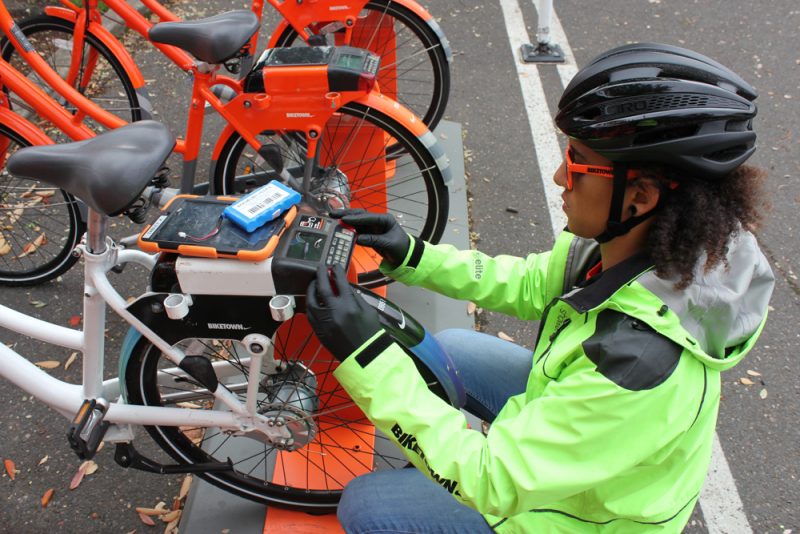
(Photos: Kate Johnson)
Our “Gal By Bike” columnist Kate Johnson recently spent a day embedded with Biketown mechanics and rebalancers. She last wrote about guerrilla artwork on neighborhood greenways.
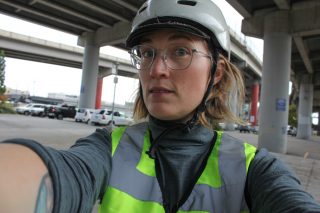
One fine evening in July of 2016 I just so happened to find myself on a corner outside a warehouse in inner southeast Portland.
Biketown was just days away from launching and the anticipation throughout the city was palpable. Thanks to a truck outside the building, I was able to peer into the windows and see a full fleet of 1,000 loud orange bikes lined up like readied soldiers. I’m not exaggerating when I say that I still well up a bit just thinking about that sight. That room wasn’t just filled with bikes, it was filled with hope — hope that the title of “best bike city” wasn’t just a fluke and hope that we were on the precipice of a great transportation revolution.
Since that day, I have imagined Biketown headquarters to be absolute mania. I envisioned bikes swarming to and fro, bike stands littering the entire warehouse floor — each manned by a mechanic tirelessly torquing their wrenches as sweat beads on their forehead. Much like the New York Stock Exchange — but with bright orange bikes. This is not at all what I found when I visited the headquarters last week. As it turns out, keeping a giant operation of 1,000 bikes and 100 stations going doesn’t have to come down to chaos and hustle and bustle. The folks at Biketown are working smart, efficiently, and having “the most fun you’ll find in any office in Portland” as one employee put it. After spending a day watching how Biketown functions, to say I was impressed would be an understatement.
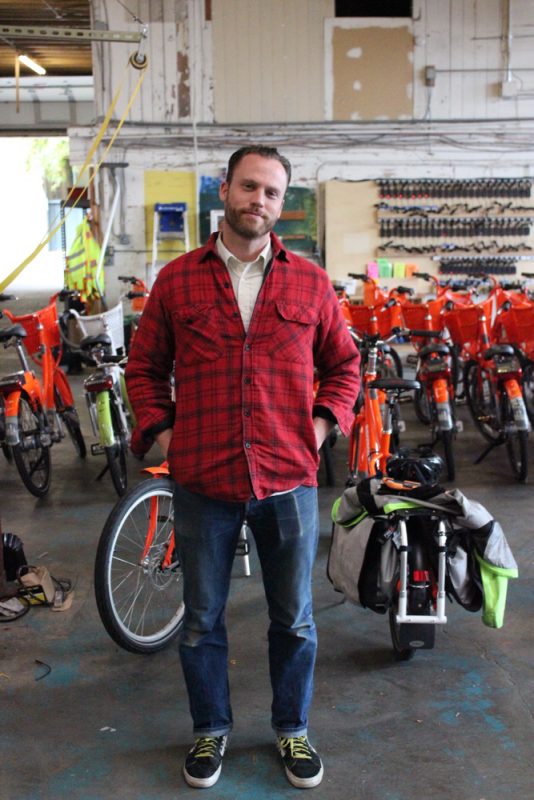
While there’s a great deal of technology that goes into powering Biketown, a lot of the work boils down to decisions made by the individual employees. Most of my day was spent shadowing the mechanical and balancing portion of Biketown’s operation and I was surprised to see that there was no specific algorithm dictating the day’s work. The mechanics and rebalancers appear to govern their own business — enjoying a great deal of autonomy with everyone else throughout the office, from directors to operations associates. There’s a definite sense of independence and respect across the board.
James Keating, lead mechanic, was my first point of contact when I walked in the door at Biketown headquarters. After ten years of working with Portland’s Community Cycling Center, Keating now oversees four mechanics. As a team, they are making sure that each and every bike you step onto is safe and fully functional. Keating informed me that many mechanical issues are reported directly from bike share users. He chuckled a little while recounting some of the long and detailed reports he’s received from users. Keating and the other mechanics make monthly safety checks a priority along with annual overhauls of each bike. With a one thousand bike fleet, that is no small feat. Keating points to the uniformity and utility of the bikes as a strength — allowing new mechanics to be more easily trained to deal with the common and reoccurring fixes that the fleet requires. I was under the impression that my time would be spent sitting alongside the mechanics, watching them do their thing in the warehouse. The longtail bike filled with tools and blindingly bright safety vest waiting for me suggested otherwise.

A great deal of the mechanical work is done out in the field and, with most of Biketown’s docking stations and open parking areas located in high traffic and pedestrian areas, it should come as no surprise that this work is most efficiently done by bike. I would be lying if I said I wasn’t overly excited to ride around town on an official Biketown longtail bike. Mechanic, Nissy Cobb, was kind enough to slow down for me and show me how her job’s done. You see, when Cobb isn’t riding an average of 10+ miles per day throughout Portland’s Biketown service area, she’s out absolutely crushing it as an American Track Cyclist specializing in sprinting — a fact that she very modestly glossed over when she shared with me that “she likes to ride track”. When I was introduced to Cobb she was busy planning her route for the day on a simple laminated service area map labeled with dry erase marker. Her goal each day is to complete as many repairs out in the field as possible while being efficient with her time spent commuting from one site to another.
Advertisement
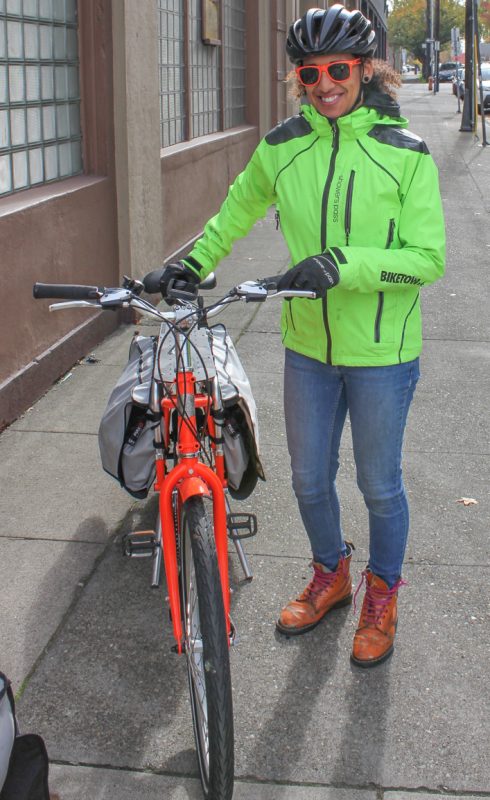
Cobb grew up in Portland and, as she proudly stated, did not get her driver’s license until she turned 23 years old. She’s gotten around by bike for as long as she can remember, and her ability to get from one site to another without staring at a map was pretty impressive to me. When I asked her what her favorite piece of bike infrastructure was in the city, she spoke very fondly of the now removed Better Naito project. “Why would they get rid of that!?” she asked as we headed toward our first repair. She went on to explain how much easier it made her job. Cobb mirrored the same confidence and calm shared with everyone else I would go on to meet. Rolling with the punches and handling each mechanical issue with clear knowledge and expertise being her specialty.
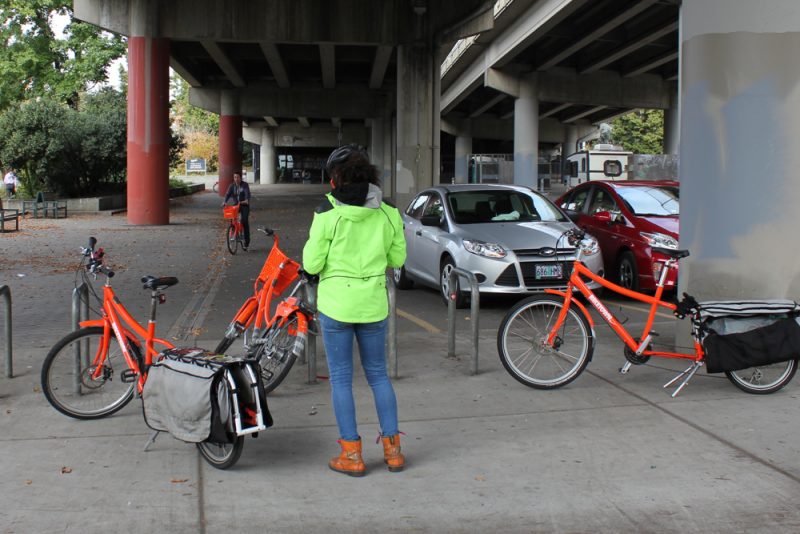
The first repair was located under the highway near the Vera Katz statue on the East Bank Esplanade. The scene we found was all too common for Cobb, but quite shocking for me. Imagine a Biketown bike slumped haphazardly against a bike rack with all of it’s technological insides ripped out and strewn around carelessly. Cobb laughed as she informed me that this bike was labeled in the system as having “connection issues” — a definite understatement. You never know if you’re going to come across a simply resolved computer issue or a complete massacre. After cleaning up the area and filling out a series of forms, the bike was left to be picked up later using the hauling trike. Replacing and reformatting Biketown bike computer systems remain the most expensive and prevalent repair for the company. “There are a lot of people out there that simply don’t like Biketown”, Cobb explained.
More connection errors, some battery replacements due to dwindling sunlight and usage with the changing season, and a brake adjustment that Cobb made look effortless followed before we returned to headquarters and Cobb turned me over to Brian Soutavong — fleet balancing extraordinaire. Like Cobb, Soutavong appeared to call the shots that dictate his day. His goal is to maintain an optimal number of available bikes at each of Portland’s 100 docking stations. It’s likely that you’ve seen the Biketown rebalancing vans out and about throughout Portland. On this day, you may have seen me, comically struggling to mimic Soutavong by attempting to get two 60 pound bikes up the van ramp at a time. Soutavong literally appeared to be floating up the ramp while I literally grunted my way halfway before he so mercifully removed one of the bikes from my grasp. This position is no joke, folks. These bikes are heavy and, as with any job where you’re out and about in a busy city, there are sometimes unforeseen dangers or threats that may come your way.
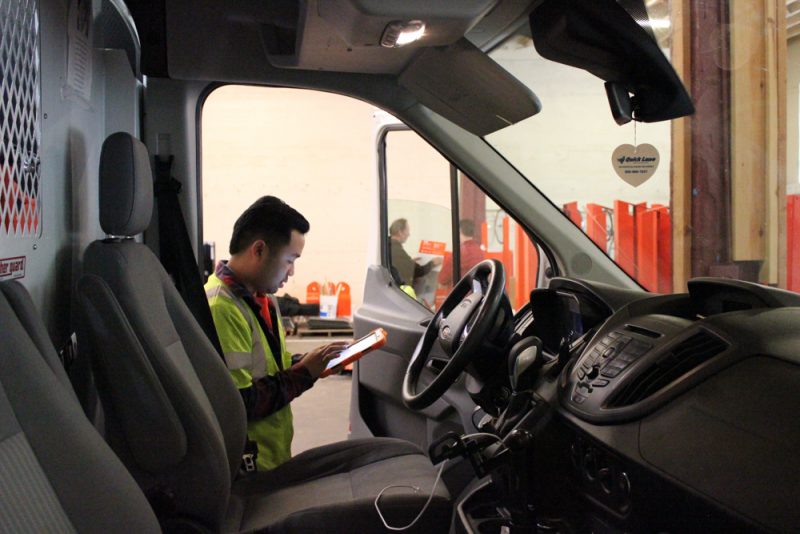
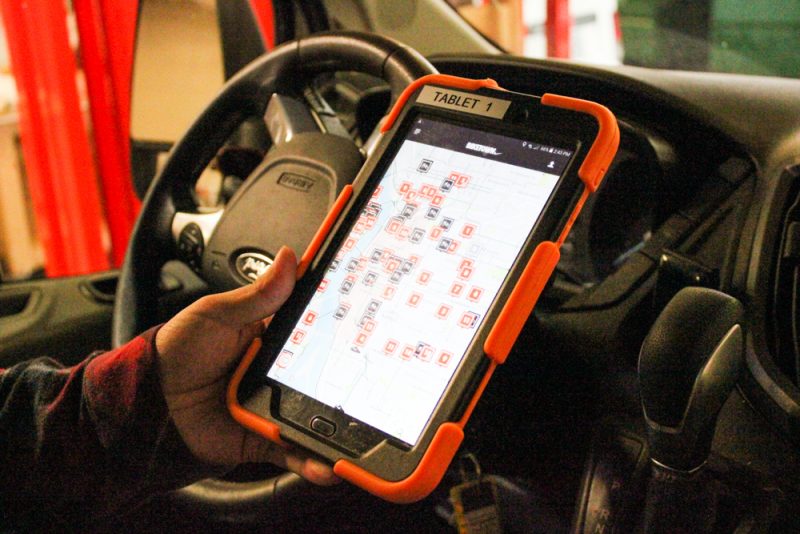
While helping with some bike loading at a docking station outside the Pine Street Market in southwest, I was waiting for Soutavong to come down from the van ramp before handing one of two bikes on to him when an individual with mental health needs began to walk toward me. In an attempt to appear as unthreatening as possible as he came toward me yelling, I turned away, allowing him to proceed past me. Upon passing, he became frustrated, yelled “get out of my way!”, and proceeded to sucker punch me in my right upper arm. Shocked and dazed, I allowed him to proceed, not knowing what the protocol is in this situation. Unfortunately, this is not an uncommon occurrence in our city, and it’s a potential hazard for the employees working directly with the bikes – finding themselves strung across Portland on the daily.
When I asked Soutavong if anything like that had ever happened to him, he recounted a time when he was verbally attacked by a woman who screamed at him to justify to her how he could work for a company like Nike. Soutavong responded that he does not work for Nike, he works for a company called Motivate that gets some sponsorship from Nike. The truth is that the employees of Motivate that make sure Biketown is running smoothly are working to make the city we live, a city that millions of tourists visit each year, a more livable and vibrant city. They’re doing it with thoughtfulness, enthusiasm, and passion. Employees are treated and compensated fairly for the work that they do. They also enjoy full benefits, a 401 K, and several other incentives that would be tough to argue were anything but respectable.
There is a lot to improve about the streets of Portland and the inequality that exists on them. These issues may be easier to avoid when you are alone in your car. Bike share asks us to be bigger than ourselves and impresses the need to work together to solve these looming problems. Biketown is a very human and real part of the solution.
If you’re one of the individuals who have helped Biketown clock over 574,693 miles, rest assured that you’re supporting a human-run operation that cares about you and your safety as you move about our city. Take a minute to thank the next mechanic or rebalancer that you see out and about. They’re job isn’t easy, though they may make it look as though it is.
I would like to personally thank Biketown and the folks at Motivate for letting me spend the day with them and for allowing me to spontaneously and happily bike about this city I call home.
— Kate Johnson. Read more from her Gal By Bike column.
Never miss a story. Sign-up for the daily BP Headlines email.
BikePortland needs your support.



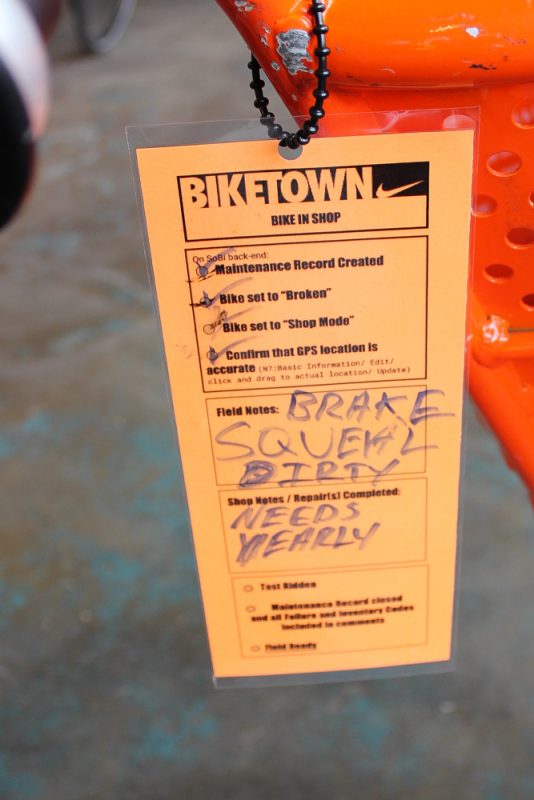
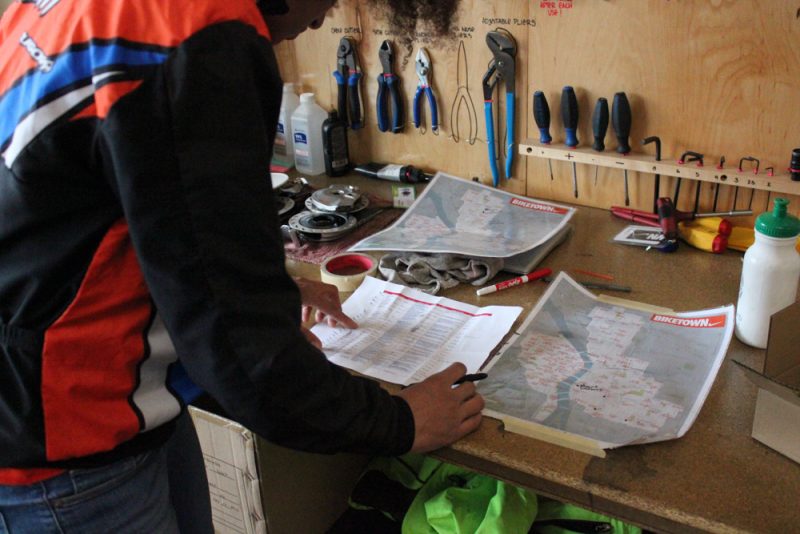
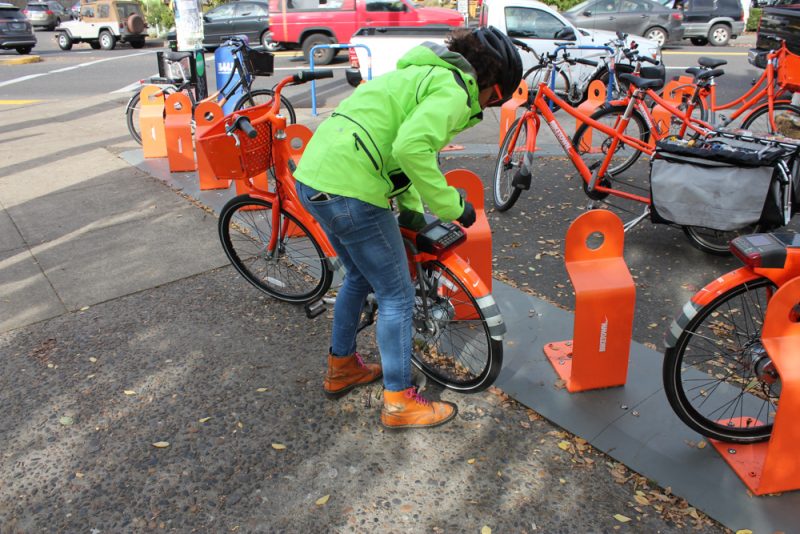
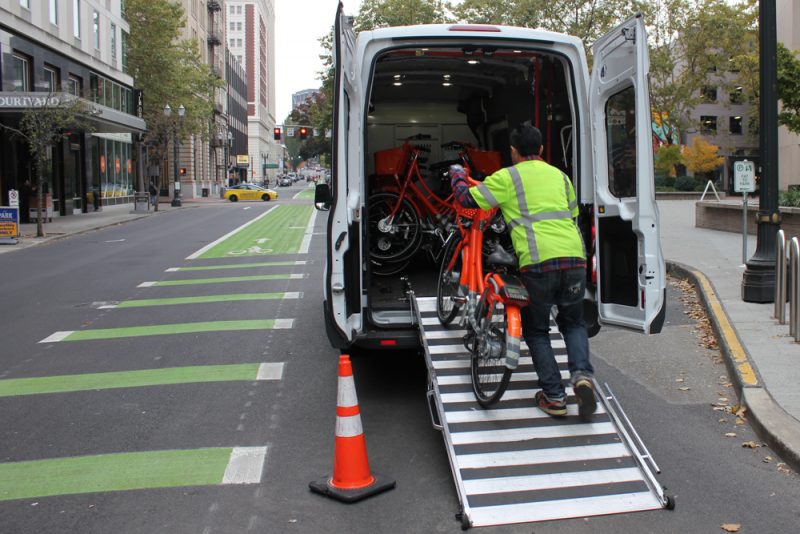
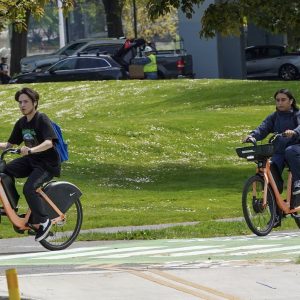
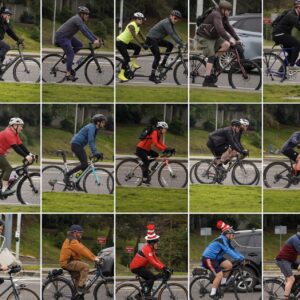

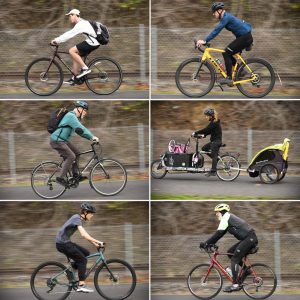
Thanks for reading.
BikePortland has served this community with independent community journalism since 2005. We rely on subscriptions from readers like you to survive. Your financial support is vital in keeping this valuable resource alive and well.
Please subscribe today to strengthen and expand our work.
Thanks for this story Kate, it gives me new found respect for the Biketown operation and the tough job they are doing well.
Great article about cool people – and I like those longtail bikes!
One thing I like about Biketown is how good the bikes are. Significantly nicer than, say, Citibikes. Nice to see how much attention Biketown’s staff pays to keeping the bikes working well.
I love this look into how Biketown works. Thanks for taking the time to write this article!
Most of the Biketown bikes I use are in great shape. Sometimes I wish there was a “Report this Bike as Nicely Tuned” option on the keypad. Thanks Biketown staff!
Nice article. I enjoyed the upbeat tone while not flinching from talking about the down-sides to what is going on.
It is a bit depressing to know that there are people who are ripping the electronics apart. Are we becoming an entire culture of middle-school boys? Still, it’s great that there are people who aren’t letting our societal failings prevent us from having nice things.
Thanks for the profile. I’ve been curious about the operations behind the scenes. I’m sorry you got verbally and physically assaulted in the course of your research!
Great article Kate! Bikesharing in the US is at the tipping point of exploding in a good way. The next evolution is happening already through transition to e-assist bike sharing to enable the less able bodied. The last social hurdle to clear is mass social acceptance. It is not a matter of if, but when this occurs. Current headwinds are continued mass public and private subsidies to motordom, but without such subsidies the economics of bicycling prevail easily as most subscribers of this blog already know.
In the last year I’ve been fortunate to experience bikesharing in NYC, Fort Collins, Boulder, Chattanooga, Albuquerque and most recently Chicago. There are many direct and indirect benefits of using your local system regardless of the colors of the bikes or the sponsor. When I use our system I am making life more simple by keeping miles/wear and tear off my existing fleet of bicycles and I never have to worry about theft or even bringing my keys, wallet or phone.
Bike sharing has nothing to do with your bike. At the very least it is part of a healthy transportation system for first-mile/last-mile solutions. Portland is lucky to have BikeTown and I look forward to seeing it continue to thrive.
I should note too with all my favorable comments on BikeTown I think we have room to allow competition in to appease the demand from outside the BikeTown “zone.” Likely MoBike & LimeBike. I saw MoBike on the ground in Chicago.